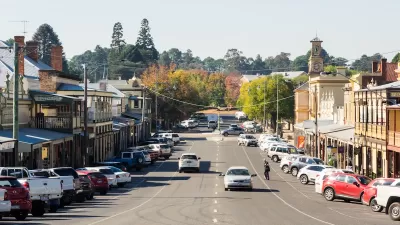As the world's population urbanizes, rural areas are being abandoned. But they don't have to sit empty and unused, according to this piece from GOOD.
Noam Ross argues that the rural areas that are losing population still have an active role to play in maintaining a healthy global ecosystem.
"The millions of acres left abandoned represent a changed relationship with the landscape and a societal and economic opportunity. We can use these lands to re-invest in natural capital and biodiversity but to be successful, such land restoration will not be a passive process. It will require active management, capital, skill, and technology, but it will leave us safer, healthier, and more prosperous.
Active investment in natural systems is necessary in order to ensure a healthy supply of ecosystem services. Ecosystem services, such as crop pollination, water purification, and flood protection, are the benefits we receive from natural processes."
FULL STORY: If Everyone Moves to the City, What Gets Left Behind?

Planetizen Federal Action Tracker
A weekly monitor of how Trump’s orders and actions are impacting planners and planning in America.

Chicago’s Ghost Rails
Just beneath the surface of the modern city lie the remnants of its expansive early 20th-century streetcar system.

San Antonio and Austin are Fusing Into one Massive Megaregion
The region spanning the two central Texas cities is growing fast, posing challenges for local infrastructure and water supplies.

Since Zion's Shuttles Went Electric “The Smog is Gone”
Visitors to Zion National Park can enjoy the canyon via the nation’s first fully electric park shuttle system.

Trump Distributing DOT Safety Funds at 1/10 Rate of Biden
Funds for Safe Streets and other transportation safety and equity programs are being held up by administrative reviews and conflicts with the Trump administration’s priorities.

German Cities Subsidize Taxis for Women Amid Wave of Violence
Free or low-cost taxi rides can help women navigate cities more safely, but critics say the programs don't address the root causes of violence against women.
Urban Design for Planners 1: Software Tools
This six-course series explores essential urban design concepts using open source software and equips planners with the tools they need to participate fully in the urban design process.
Planning for Universal Design
Learn the tools for implementing Universal Design in planning regulations.
planning NEXT
Appalachian Highlands Housing Partners
Mpact (founded as Rail~Volution)
City of Camden Redevelopment Agency
City of Astoria
City of Portland
City of Laramie



























